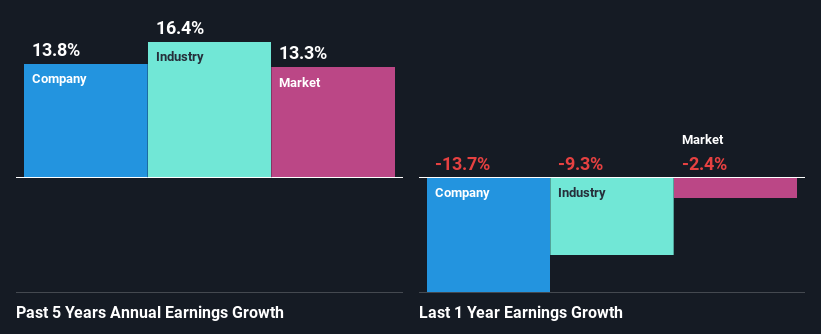Is Weakness In Thermo Fisher Scientific Inc. (NYSE:TMO) Stock A Sign That The Market Could be Wrong Given Its Strong Financial Prospects?
Thermo Fisher Scientific (NYSE:TMO) has had a rough month with its share price down 4.7%. But if you pay close attention, you might gather that its strong financials could mean that the stock could potentially see an increase in value in the long-term, given how markets usually reward companies with good financial health. Particularly, we will be paying attention to Thermo Fisher Scientific's ROE today.
Return on equity or ROE is a key measure used to assess how efficiently a company's management is utilizing the company's capital. In simpler terms, it measures the profitability of a company in relation to shareholder's equity.
View our latest analysis for Thermo Fisher Scientific
How To Calculate Return On Equity?
The formula for return on equity is:
Return on Equity = Net Profit (from continuing operations) ÷ Shareholders' Equity
So, based on the above formula, the ROE for Thermo Fisher Scientific is:
13% = US$6.0b ÷ US$47b (Based on the trailing twelve months to December 2023).
The 'return' refers to a company's earnings over the last year. Another way to think of that is that for every $1 worth of equity, the company was able to earn $0.13 in profit.
What Is The Relationship Between ROE And Earnings Growth?
We have already established that ROE serves as an efficient profit-generating gauge for a company's future earnings. Depending on how much of these profits the company reinvests or "retains", and how effectively it does so, we are then able to assess a company’s earnings growth potential. Assuming everything else remains unchanged, the higher the ROE and profit retention, the higher the growth rate of a company compared to companies that don't necessarily bear these characteristics.
Thermo Fisher Scientific's Earnings Growth And 13% ROE
To begin with, Thermo Fisher Scientific seems to have a respectable ROE. Even when compared to the industry average of 12% the company's ROE looks quite decent. This probably goes some way in explaining Thermo Fisher Scientific's moderate 14% growth over the past five years amongst other factors.
We then performed a comparison between Thermo Fisher Scientific's net income growth with the industry, which revealed that the company's growth is similar to the average industry growth of 16% in the same 5-year period.
The basis for attaching value to a company is, to a great extent, tied to its earnings growth. It’s important for an investor to know whether the market has priced in the company's expected earnings growth (or decline). By doing so, they will have an idea if the stock is headed into clear blue waters or if swampy waters await. Is Thermo Fisher Scientific fairly valued compared to other companies? These 3 valuation measures might help you decide.
Is Thermo Fisher Scientific Efficiently Re-investing Its Profits?
Thermo Fisher Scientific's three-year median payout ratio to shareholders is 5.9% (implying that it retains 94% of its income), which is on the lower side, so it seems like the management is reinvesting profits heavily to grow its business.
Moreover, Thermo Fisher Scientific is determined to keep sharing its profits with shareholders which we infer from its long history of paying a dividend for at least ten years. Our latest analyst data shows that the future payout ratio of the company over the next three years is expected to be approximately 6.5%. Still, forecasts suggest that Thermo Fisher Scientific's future ROE will rise to 20% even though the the company's payout ratio is not expected to change by much.
Conclusion
On the whole, we feel that Thermo Fisher Scientific's performance has been quite good. Specifically, we like that the company is reinvesting a huge chunk of its profits at a high rate of return. This of course has caused the company to see substantial growth in its earnings. Having said that, the company's earnings growth is expected to slow down, as forecasted in the current analyst estimates. To know more about the latest analysts predictions for the company, check out this visualization of analyst forecasts for the company.
Have feedback on this article? Concerned about the content? Get in touch with us directly. Alternatively, email editorial-team (at) simplywallst.com.
This article by Simply Wall St is general in nature. We provide commentary based on historical data and analyst forecasts only using an unbiased methodology and our articles are not intended to be financial advice. It does not constitute a recommendation to buy or sell any stock, and does not take account of your objectives, or your financial situation. We aim to bring you long-term focused analysis driven by fundamental data. Note that our analysis may not factor in the latest price-sensitive company announcements or qualitative material. Simply Wall St has no position in any stocks mentioned.

 Yahoo Finance
Yahoo Finance 
